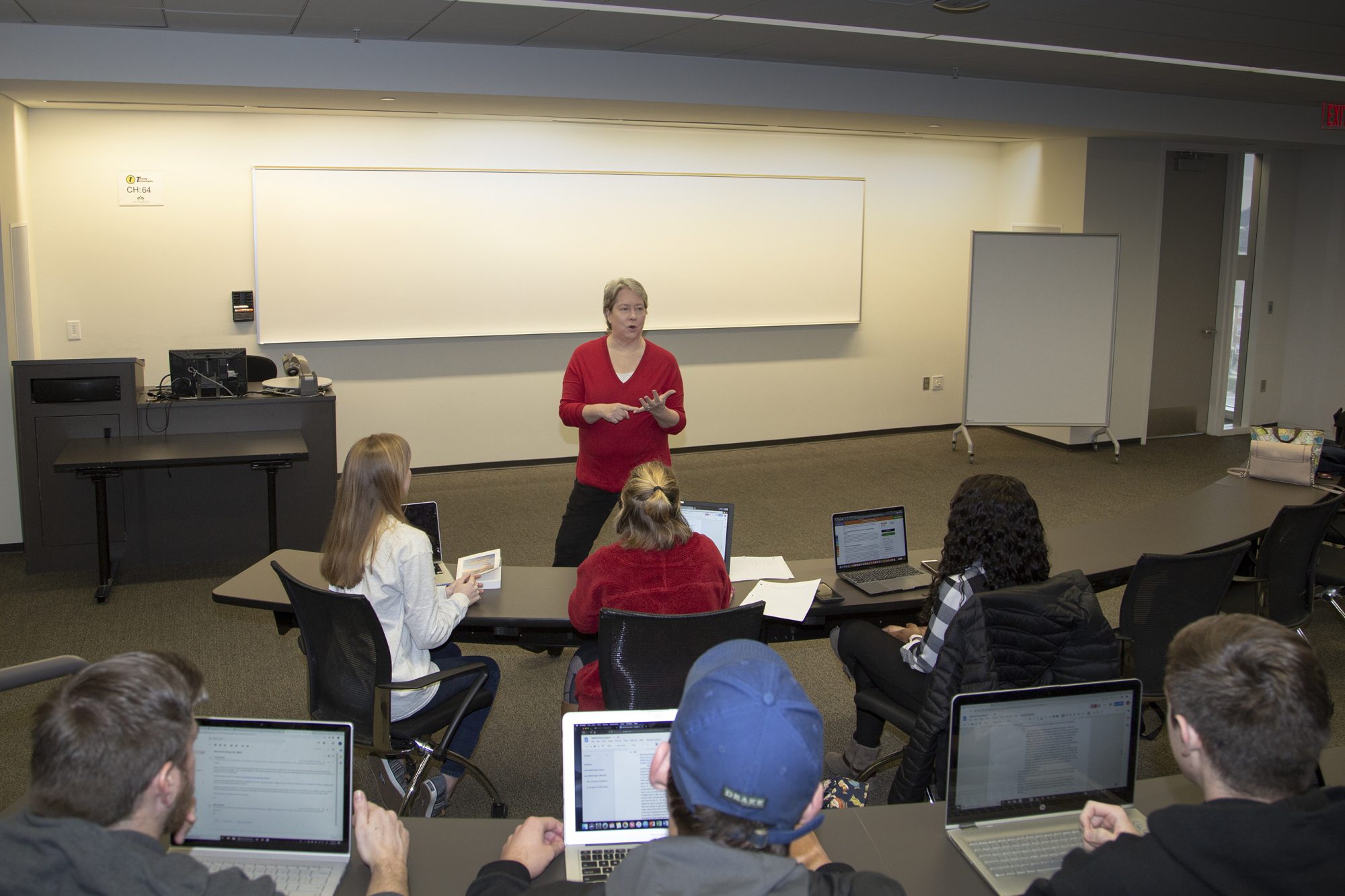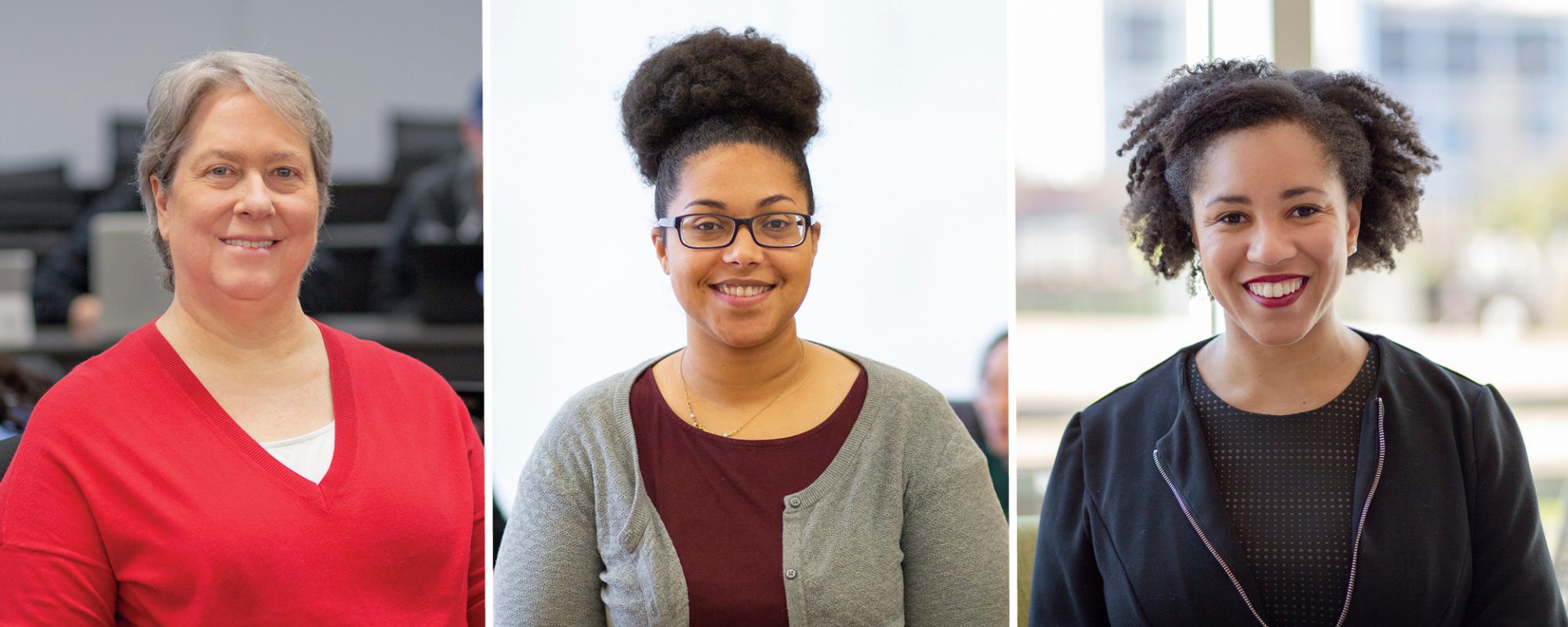The leadership trio driving the M.S. in Management program
The world’s workplaces have changed dramatically. Undergraduates from virtually every discipline have myriad employment opportunities. But by adding a Master of Science in Management, they will set themselves apart from the rest of the competition.
“Here in the Belk College of Business, we responded to what Charlotte-area employers were telling us in the development of this degree program,” said Carol Stivender, director of the Master of Science in Management. “Employers appreciated the diversity in thought and perspective that liberal arts and sciences majors brought to the workplace, but they said these new graduates would benefit from having a better understanding of core business functions.”
 Belk College’s Master of Science in Management is the first of its kind in the UNC System. Undergraduates from UNC Charlotte, or any college, can extend their educational career for 10.5 months to earn this valuable credential. Belk College is taking the lead to prepare UNC Charlotte graduates for the world of work, not only in the Charlotte region, but across the state, nation and worldwide, as many European countries have offered similar management training for years.
Belk College’s Master of Science in Management is the first of its kind in the UNC System. Undergraduates from UNC Charlotte, or any college, can extend their educational career for 10.5 months to earn this valuable credential. Belk College is taking the lead to prepare UNC Charlotte graduates for the world of work, not only in the Charlotte region, but across the state, nation and worldwide, as many European countries have offered similar management training for years.
“Prospective employers value the passion students have for a particular area of study, such as art, history, health, education, sociology or engineering, but they also are seeking job candidates who can make an immediate impact within their organization—through the business acumen, professionalism and leadership skills imparted through our M.S. in Management,” Stivender stated. A music major, she noted she can relate to how students’ passions can drive their futures.
Stivender, a clinical professor in economics, is one of the award-winning, highly regarded Belk College faculty members who teach in the program. Students who enroll in the program will acquire an understanding of these foundational skills: financial analysis/reporting, organizational behavior, technology as it applies to businesses, ethics and leadership.
Providing an exceptional advising and student support system is a key aspect of the Master of Science in Management Program.
Sabrina Brown, assistant director of graduate student services, is working with the enrollees of the initial student cohort to ensure they reach their full academic and professional potential.
“I love connecting with people, learning about their dreams and working with them to help achieve them,” said Brown. “I connect students to the possibilities that are open to them, and I hope that means them becoming students of the M.S. in Management program.”
Brown said the cohort model fosters an effective learning environment, but it enables student growth to occur outside the classroom, which she sees in working with students either one-on-one or in small groups.
For example, minor conflict happens as part of team projects, in class as it would on the job. Brown, in her role as an advisor, can help students move toward resolution.
“I ask prompting questions that a student can use to work through the situation,” said Brown. “We discuss how to engage with others in a way that will address the conflict and move forward. That’s a valuable skill to learn, because on the job, a supervisor will not come in and say, ‘Everybody be nice to each other.’”
Working with students from such diverse backgrounds is exciting for Brown; she sees that as a critical component of the program.
“I hope this cohort and our future students come into this program and develop an appreciation for the power of diversity in the workplace,” Brown stated. “They can become leaders who start to create new policies and shift corporate cultures to make businesses more diverse, more inclusive, more collaborative and more innovative.”
Solange Tricanowicz, assistant director for employer relations and career and professional development, also works with students to help prepare them to be career-ready.
 “Students should be both strategic and flexible in their professional journeys,” said Tricanowicz. “I want them to know that opportunities present themselves in funny ways, so it is prudent to know what you want your end game to be while also knowing that you can learn from the unexpected.”
“Students should be both strategic and flexible in their professional journeys,” said Tricanowicz. “I want them to know that opportunities present themselves in funny ways, so it is prudent to know what you want your end game to be while also knowing that you can learn from the unexpected.”
Prior to UNC Charlotte, Tricanowicz worked for the Charlotte Chamber, so she brings a wealth of networking experience to her role with the Master of Science in Management Program.
As part of the degree’s professional development component, Tricanowicz conducts a seminar three hours each week, and she is meeting with students four times in the spring on targeted networking opportunities.
“I approach career development on a personal level, which means helping each student tell his or her story,” Tricanowicz said. “We do resumes, we do interviews, we do personal branding, and we bring in prospective employers to help deliver content, which is a really important factor. If a future employer reiterates the same concepts that I am saying, it resonates even more.”
Three program leaders, working on three very important aspects of program, are the driving force behind the Master of Science in Management. Their goal is to enable those who have completed undergraduate studies from virtually any discipline to acquire the necessary business background to undertake leadership roles at the ready.

